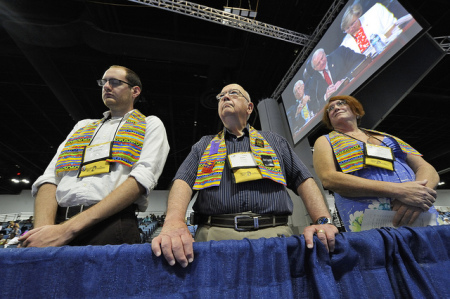United Methodist Church leaders officially propose split over gay marriage, clergy

United Methodist Church leaders have proposed a plan that would formally split the denomination after years of division over non-celibate LGBT clergy and same-sex marriage, with the formation of a new denomination for Methodists who hold to a biblical understanding of marriage and sexuality.
The proposal, released Friday from a 16-member group of bishops and church leaders on both sides of the debate, says a separation was "the best means to resolve our differences, allowing each part of the Church to remain true to its theological understanding, while recognizing the dignity, equality, integrity, and respect of every person."
Under the nine-page plan, a new “traditionalist Methodist” denomination would be created for more conservative Methodists. The new denomination would continue to hold to a biblical understanding of marriage and oppose the ordination of non-celibate gay and lesbian clergy.
Conservative churches that leave would be given $25 million to start their own denomination, under the new agreement. Additionally, clergy members who leave would keep their United Methodist Church pensions.
Meanwhile, the remaining portion of the United Methodist Church would permit same-sex marriage and LGBT clergy for the first time in its history.
The United Methodist Church is the United States’ largest mainline Protestant denomination.
A restructuring of the denomination over LGBT issues had been anticipated since last February, when 53% of church leaders and lay members voted to maintain its traditional stance against same-sex marriage and non-celibate gay clergy. As laid out in the Book of Discipline, the UMC defines homosexuality as “incompatible with Christian teaching.”
In the months following, a plan was put together by a 16-member committee of bishops and other church representatives with the help of Kenneth Feinberg, a mediation expert who handled the compensation fund for victims of the 9/11 terrorist attacks.
“The United Methodist Church and its members — after careful reflection, discussion and prayer — have fundamental differences regarding their understanding and interpretation of Scripture, theology and practice,” notes the proposal.
The proposal requires approval by the 2020 General Conference in May, according to UM News. Drafting of legislation is still underway for the legislative assembly, which is the only body that speaks for the 13 million global denomination. Conservative and liberal church leaders said they expect the agreement to pass.
“The solution that we received is a welcome relief to the conflict we have been experiencing,” said pro-LGBT pastor Thomas Berlin, according to The New York Times. “I am very encouraged that the United Methodist Church found a way to offer a resolution to a long conflict.”
Keith Boyette, a signatory to the deal who is president of the Wesleyan Covenant Association, a collection of more than 1,000 conservative congregations that oppose same-sex marriage, told The Wall Street Journal that with the new proposal, the church has “essentially put this conflict behind us.”
“For traditionalists, we can now focus on the next steps. That would not be achievable if there were not this kind of plan in place,” he said, adding that he, along with other members of the association, had already put out a draft book of bylaws that a new, traditionalist denomination could use.
He estimated that as much as 30 to 40% of the denomination in the U.S. would leave the United Methodist Church.
The Washington Post notes that Friday’s announcement came as new sanctions were set to go into effect, including suspension and/or expulsion for clergy who officiate same-sex weddings.
However, leaders from liberal and conservative groups signed an agreement saying they will postpone those sanctions and instead vote to split at the worldwide church’s May general conference, according to the Post.
The United Methodist Church has fought bitterly about LGBT inclusion for years, with some church leaders seeing a split as inevitable.
In December, the 2,800-member Grace Fellowship UMC of Katy, Texas, voted to leave the mainline denomination because of its debate over homosexuality.
Jim Leggett, the founding pastor of Grace Fellowship, told The Christian Post that his congregation wanted “to remove ourselves from the dysfunctional fighting going on in the United Methodist Church so that we can fully devote our energies to fulfilling the mission and vision that God has given to us.”
“At one point, we looked up and noticed that we were spending easily 30 percent of our leadership meeting time discussing the issues of the UMC, and we realized that this was not good stewardship of our time and resources for the Kingdom of God,” said Leggett.
“In the last year, it has become clear to us that despite having biblical standards of morality on paper in the denomination’s Book of Discipline, the leadership of the United Methodist Church is unable or unwilling to live by those standards.”
The details of the agreement are outlined in the Protocol of Reconciliation & Grace Through Separation, which was released today.





















